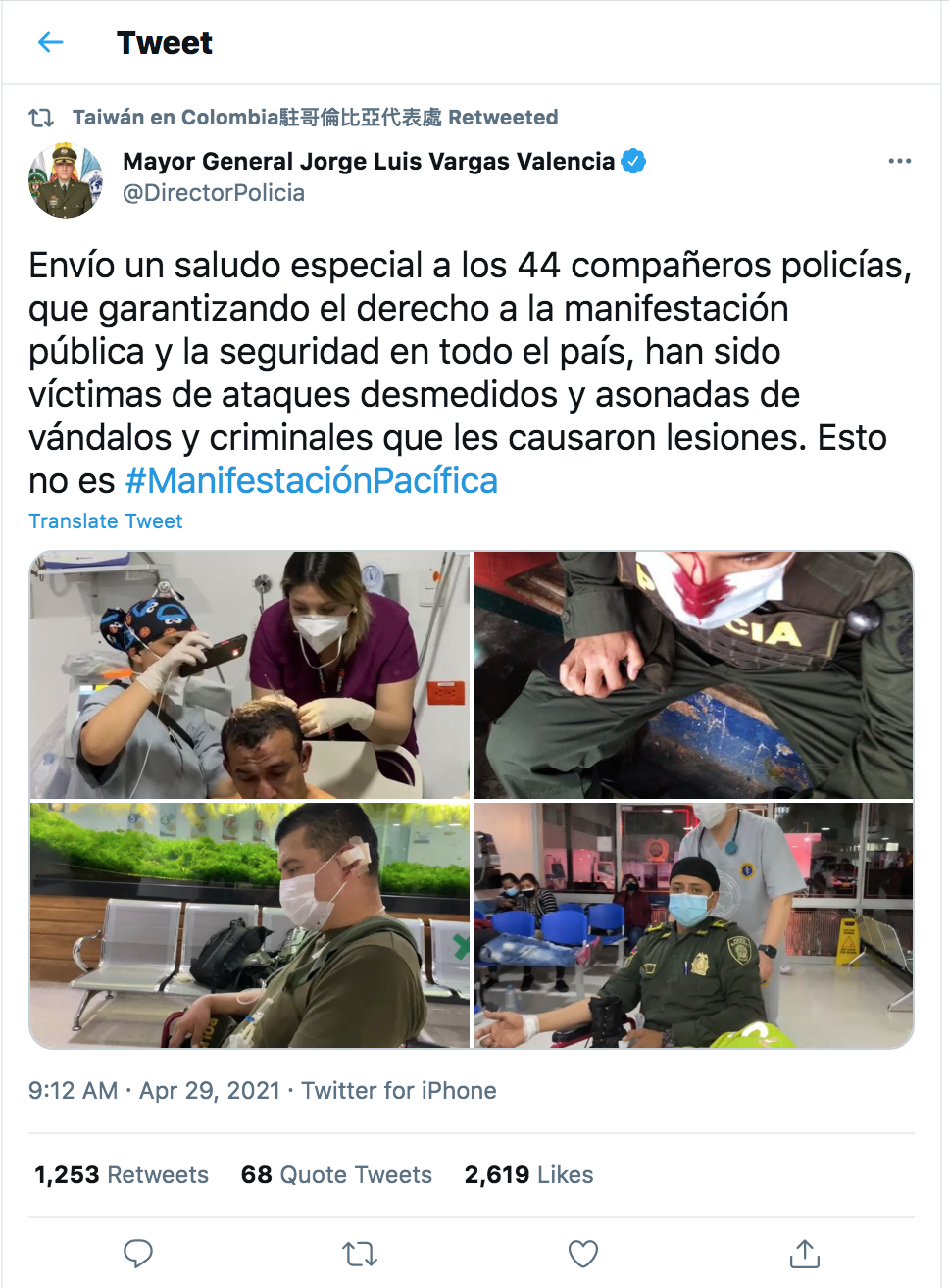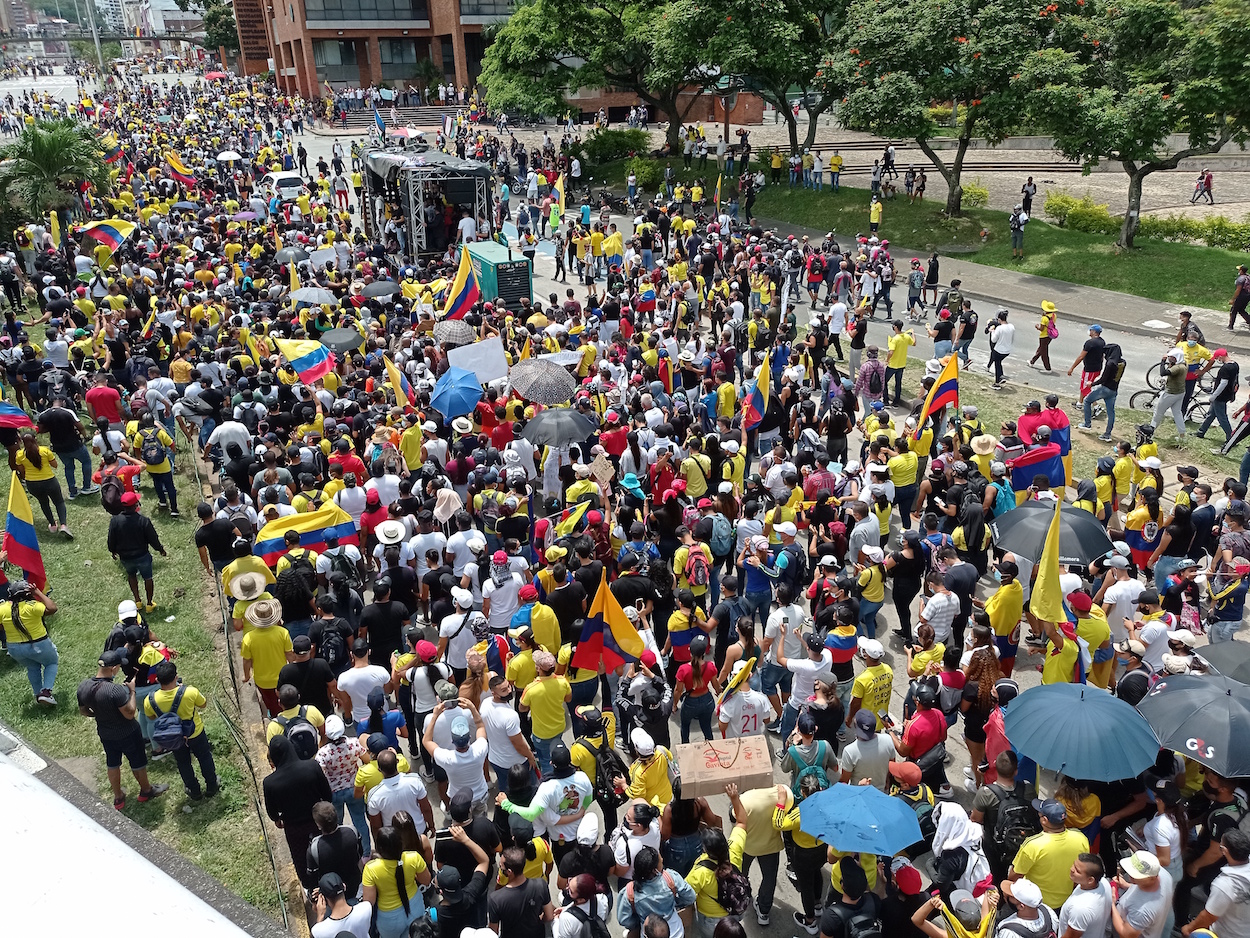by Brian Hioe
語言:
English
Photo Credit: Humano Salvaje/WikiCommons/CC
INCIDENTS OF Taiwanese diplomatic accounts on Twitter retweeting authoritarian propaganda are, unfortunately, not uncommon. This would be what happened on Twitter earlier this month after the Twitter account for Taiwan’s representative office in Colombia, Taiwán en Colombia 駐哥倫比亞代表處, retweeted a photo showing members of the Colombian police being treated after injuries from Major General Jorge Luis Vargas Valencia. The retweet was mixed in with other tweets otherwise touting the diplomatic friendship of Taiwan and Colombia or expressing support for campaigns by Taiwan aimed at securing international recognition, in the form of participation in international organizations.
Valencia is the director of the Colombian police. His tweet came after violent police force was used to put down protests against new tax reforms introduced by the Colombian government that left seventeen dead and over 800 injured. Of the seventeen dead, sixteen were civilians, while one was a member of the police. With some deaths remaining unconfirmed, it is thought that the death toll could rise, seeing as some counts have other twenty deaths.
 The Tweet in question
The Tweet in question
While the Colombian government claims that the new tax reforms are needed to balance the budget, given an economic downturn that led the GDP to drop by 6.8%—the largest drop in over fifty years. The protests, which took place for over five days and in multiple cities, eventually led the Colombian government to drop plans for the new tax reforms.
The administration of Iván Duque Márquez, the current president of Colombia, has seen repeated fatal incidents involving violence committed by police in past years. This includes the deaths of seven last September after protests that originally broke out because a man was tasered to death, tens of thousands protesting after the death of a teenager due to police force in November 2019, and incidents in which Márquez was criticized for ordering the deployment of riot police for peaceful protests.
Past incidents of questionable retweets by Taiwanese diplomatic accounts include the Taiwanese Ministry of Foreign Affairs reposting articles from far-right-wing American news outlet Breitbart, whose views verge on neo-Nazism, but which was favored by former US president Donald Trump. It is unclear whether the retweet was accidental, due to diplomatic incompetence, or an attempt to curry favor with Trump, whose administration saw a number of actions that benefited Taiwan with the aim of hitting back against China. The article in question was about polio vaccinations in China.
Otherwise, Taiwanese diplomatic accounts have sought to hit back at negative press before, including attacking an article from The Guardian reporting on “dollar diplomacy” from Taiwan. The term refers to the Taiwanese government offering economic incentives to countries to maintain relations with it.
The retweet by the Taiwán en Colombia account could genuinely have been due to lack of awareness or incompetence; one notes expensive advertising campaigns paid for by representative offices of the Taiwanese government abroad that have involved gross incompetence in the past. But, that being said, it is also not uncommon for the Taiwanese government to throw its support behind authoritarian regimes, if they support Taiwan.
 The protests in Colombia. Photo credit: Remux/WikiCommons/CC
The protests in Colombia. Photo credit: Remux/WikiCommons/CC
Apart from the obvious example of Donald Trump, this has included backing the election victory of Juan Orlando Hernandez of Honduras. Hernandez’s election victory in 2017 was accused by international observers of having been stolen. Likewise, Taiwan remains diplomatic allies with Eswatini, one of the world’s last absolute monarchies, and whose ruler, King Mswati III presides over a country with one of the world’s lowest adult lifespans.
More generally, the Taiwanese government is desperate for international recognition, and this has pushed it to side with authoritarian regimes, so long as they are friendly to Taiwan. In many cases, this is ironic, given Taiwan having overcome its history of authoritarianism through the decades-long democracy movement. Where police violence in Colombia is concerned, pro-democracy protests in Taiwan also faced forcible repression by the police and, as in the case of Honduras, Taiwan itself has a history of stolen elections. However, the priorities of the Taiwanese government are invariably to side with the state, rather than protests by the people, seeing as this cannot grant international recognition.
Missteps by Taiwanese diplomatic accounts are rarely remarked on domestically and so, without any diplomatic fallout within Taiwan, there is likely to be little action taken on the Taiwán en Colombia’s questionable retweet.

